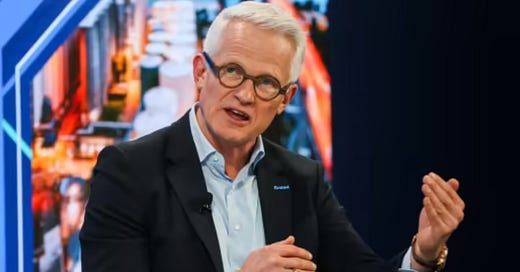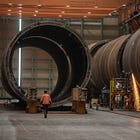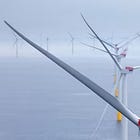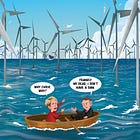"UK will struggle to lure new offshore wind projects, warns Ørsted" by Rachel Millard
"Danish wind farm developer’s chief says soaring costs dent attractiveness of the current auction round of UK government contracts"
The Financial Times published the following report yesterday.
UK will struggle to lure new offshore wind projects, warns Ørsted
Danish wind farm developer’s chief says soaring costs dent attractiveness of the current auction round of UK government contracts
By Rachel Millard in London • 10 August 2023
Danish wind farm developer’s chief says soaring costs dent attractiveness of the current auction round of UK government contracts
Ørsted chief Mads Nipper. The offshore wind industry has been struggling with high costs due to supply chain problems and high interest rates following the pandemic and Russia’s invasion of Ukraine © BloombergMads Nipper, chief executive of Ørsted, said he would “find it surprising if there’ll be a big appetite” for the round, because the maximum electricity price was not high enough to offset wind companies’ rising costs.
Nipper’s comments on Thursday underline the challenges facing the industry, weeks after rival Vattenfall halted development of its major Norfolk Boreas planned offshore wind farm off the east coast of England because it was no longer financially viable.
The offshore wind industry has been struggling with the rising expense of everything from turbines to labour and financing, due to supply chain problems and high interest rates following the pandemic and Russia’s invasion of Ukraine. In a statement in July Vattenfall said its costs had risen 40 per cent this year, outpacing the inflation-linked fixed price for electricity from Norfolk Boreas it had agreed with the UK government in July 2022.
Nipper said Ørsted was still planning to push ahead with its latest planned UK offshore wind farm, Hornsea 3, which agreed the same fixed price as Norfolk Boreas in last year’s auction round. But he did not think the latest auction round, which opened in March 2023, would “enable significant viable investments in offshore”.
Under the UK system to support renewable energy, developers bid for contracts from the government, guaranteeing a fixed price for most of a planned project’s electricity.
If the wholesale price is lower than that price, developers are paid the difference via a levy on consumer bills. If the wholesale price is higher, they must pay back the difference.
Under the current auction round, the government has set the maximum guaranteed price at £44 per megawatt-hour in 2012 prices, meaning developers will compete for contracts below this level. The price is linked to inflation, making it worth almost £60 per megawatt-hour today. Current wholesale prices are about £90 per megawatt-hour.
Nipper also warned about the risks of uncapped auctions in some countries where rights to build wind farms are awarded to the highest bidder, because of the risk of driving up prices for customers or straining supply chains.
BP and Total recently agreed to pay €12.6bn for rights to build and operate 7 gigawatts of new offshore wind projects in the North Sea and Baltic Sea following a competitive auction run by a German regulator.
“If governments choose to maximise short-term revenue, some industry players will choose to pay extremely high prices,” Nipper said. “Put very directly that’s mortgaging the future.
“There are only two ways that price can be paid — either through higher power prices for consumers and businesses in the future, [or by putting] further pressure on [a] supply chain that’s already suffering.”
Ørsted on Thursday reported a 24 per cent fall in half-year revenues, from DKr60bn (£7bn) to DKr46bn, and a 68 per cent fall in pre-tax profits, from DKr7.4bn to DKr2.4bn, partly due to lower electricity prices affecting its bioenergy division.
However, the offshore wind business performed relatively well and the company stuck with its annual profitability guidance. Nipper said he was “happy the [offshore wind] division continued to deliver the majority of our earnings”.
Shares fell 3.7 per cent to DKr553 in lunchtime trading.
What do you call an industry which is seemingly only viable when it is subsidised by governments (taxpayers) and electricity bill payers?
Related posts:











Hi Azra,
I hope you check out the cartoon I posted today. It links to Tango with Renewables. Thank you so much for the phenomenal work you're doing to expose the climate change narrative as the Mother of All Scams!
https://annecantstandit.substack.com/p/no-doubt-about-it?sd=pf